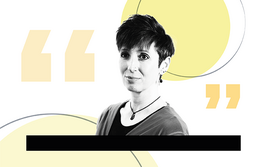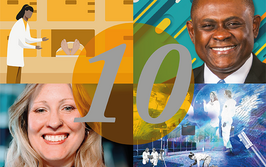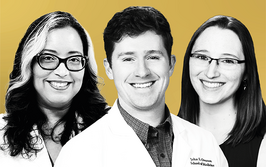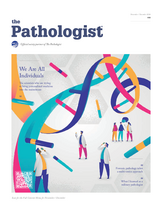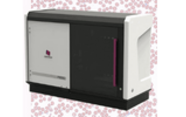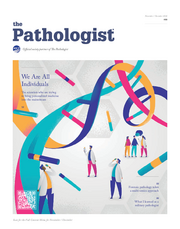
Career Snapshots with Suzana Couto
Michael Schubert interviews Suzana Couto on research, veterinary pathology, and biotech
| Video
Suzana Couto
Head of Pathology
Genmab, Princeton, New Jersey, USA
Tell us about your veterinary pathology career…
Most veterinary pathologists start their careers with a very diagnostic focus; we’re trained to do pathologic diagnosis in a variety of species. After that training, a lot of pathologists start their careers as diagnosticians – but there’s a subset who go into more investigative work and end up doing PhDs and getting into research.
As a veterinary pathologist who does diagnostics, you deal with veterinary hospital workloads, working in diagnostic labs (for infectious diseases or for specific categories of patients, such as companion animals or farm animals) or in large veterinary hospitals that have their own pathology departments. But research veterinary pathology is usually related to a university, so you do both teaching and basic research.
I do the more investigative aspect instead of the diagnostics. In my case, I do cancer research.
Your route to the lab was uncommon; how did it come about?
I fell in love with pathology quite by accident. When I was in veterinary school, my plan was to become a wildlife veterinarian and do research. You will see that that’s a very common thread among veterinary pathologists – and I know a number of MD pathologists who have taken the same route. If you’re really interested in the research part of the job, it’s easy to get into pathology, because there’s a huge amount of research you can do with that background.
Because I was interested in research, I signed up to be a veterinary student research assistant in a lab in the pathology department. I wanted to do wildlife research at the time and the only department doing anything wildlife-related was pathology. I started working there for the wildlife aspect but, as I got familiar with microscopes and slides and started exploring, I fell in love with what I saw and I decided, “I’m going to do this. I’m going to focus on pathology.” It opened a whole new world for me.
What makes veterinary pathology so unique?
I think it’s the variety of the work. Human pathologists often specialize in a certain area, such as genitourinary or breast or gastrointestinal pathology. I think the unique thing about veterinary pathology is that you deal with not only every single organ system, but also many different species. We truly have a comparative view of pathology and how disease evolves in an organism through multiple species, from lab animals to dogs and cats to horses to wildlife and exotic species and even humans. In the end, the diseases are very similar, but the possibility of engaging in a wide range of research and diagnostics is truly unique to veterinary pathology in my view.
How did you find your way into biotech?
That was also serendipitous. My plan when I got into pathology was to focus on research – my passion from the beginning – and to remain an academic in academic circles. But my PhD at the University of California, Davis was partially funded by a grant from Genentech, who invited me to give a talk about my research at their headquarters. My presentation was really well received by the pathologists at Genentech and, from then on, there was a network effect. I kept getting emails from them saying, “Hey, are you ready to come work with us?” “You know, I think you would really like working here.” I kept saying no – but, after five or six years, I said, “Well, why don’t I just give it a try? It might be really interesting.” That’s how I started my biotech career.
What’s your favorite part of your work?
I love the fact that I get to do so many different things. My entire career has been focused on cancer; in academia, I worked on cancer research and in industry, I work on cancer drug development. What I like about drug development is the variety of areas in which you can make an impact. I love the fact that I can wake up in the morning and think, “What I’m doing here has a direct impact on people’s lives.”
I’m very motivated in this area because I lost both my mother and my father to cancer fairly early; there’s a lot of cancer in my family and I have even had a personal experience with it. So I value the sense that I can have a direct impact and contribute to helping extent patients’ lives and improving their quality of life. My favorite piece of what I do right now is having that purpose. And that, to me, is very important.
Another thing I really enjoy is the variety in what we do. I can work from the very beginning of a drug investigation, when we’re just thinking about the concepts, the biology, the molecules, the mechanism of action… to the safety piece when we’re trying to investigate how safe a molecule is going to be in a patient… to the clinical piece when we’re designing biomarker strategies for clinical trials or working with diagnostic tests for patients. I do all of that.
I’m also very interested in machine learning and artificial intelligence, which is the future of pathology. We do a lot of that; we’re highly involved in workflows to get machine learning and deep learning into pathology research and diagnostics. So those are my favorite things – the purpose behind what I do and the variety of areas I contribute to in my daily work.
What one key thing would you like to share about what you do?
I think many pathologists join industry to work with toxicology and laboratory animal species. I would like aspiring professionals to know that this field is not just toxicology – there’s a lot more that can be done. There’s investigative research in which you work with basic questions of biology. There’s clinical research in which you working with questions like, “How do we stratify patients in a clinical trial?” or, “What are the biomarkers we’re looking for to understand drug response?” The key thing I would like to pass on is that there are a lot of different fields that open up from this area. It’s not a narrow path. And, ancillary to that, all the things we’ve discussed come from the same thread – loving research and following your purpose. I think the other key piece is that, as long as you’re doing something you’re interested in, you can really get engaged. From there, opportunities will open up in your career. There’s a place for everybody.

